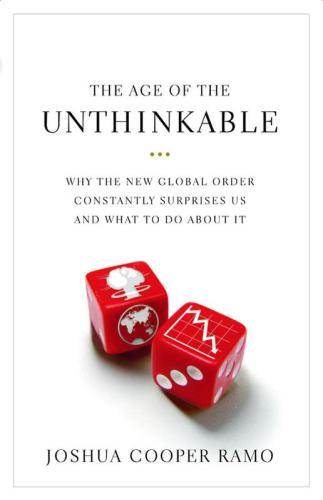
The Age of the Unthinkable
Why the New World Disorder Constantly Surprises Us And What We Can Do About It
کتاب های مرتبط
- اطلاعات
- نقد و بررسی
- دیدگاه کاربران
نقد و بررسی

Starred review from February 9, 2009
Former foreign editor of Time
, Ramo pushes the reader into uncomfortable yet exhilarating places with controversial ways of thinking about global challenges (e.g., studying why Hezbollah is the most efficiently run Islamic militant group). His book, which lays bare the flaws in current thinking on everything from American political influence to the economy, is designed to “change the physics of the way we think.” Analyzing the failure of the Bush administration's “Democratic Peace Theory” and the fruitless efforts at a Mideast peace process, Ramo suggests that people must “change the role they imagine for themselves from architects of a system they can control to gardeners in a living ecosystem.” Ramo's message—that “the most dynamic forces emerge from outside elite circles”: “geeks,” iconoclasts and maligned populations—is persuasively argued. And while the author doesn't explicitly offer up solutions, he goads readers to approach problems in unexpected ways. His revelatory work argues that there must be some audacity in thinking before there can be any audacity of hope.

February 1, 2009
Think things are weird, dangerous and frightening now? Just wait, counsels Kissinger Associates managing director and former Time editor Ramo (No Visible Horizon: Surviving the World's Most Dangerous Sport, 2003)—the mayhem is only beginning.
The world is more complex than we can imagine, Ramo notes, and in a revolutionary era, the only thing to do is"think and act like a revolutionary." He adds that those who don't"have a particular name: victims." But what should be the focal point of our revolutionary thinking? Everything, says the author, starting with the fact that all that we know is wrong, such that our decisions seem to yield the wrong results. Given that, why listen to leaders, pundits and experts who get it wrong, and why follow the old course of making"minor adjustments to current policies, incremental change to institutions that are already collapsing, and an inevitable and frustrating expansion of failure"? After setting the tone, Ramo leaps into the shark-infested waters of geopolitics. He observes that we are incorrect to believe that the triumph of the West in the Cold War was inevitable—the Soviet Union fell to"the internal implosion of a society due to faults, twists, and kinks that even today we cannot map clearly"—and that we are misguided in our thinking that our current antiterrorism efforts are doing much more than producing more active terrorists. The old assumptions about the balance of power are off, since the old deterrents are gone; suicide bombers cannot be swayed in the same way cautious diplomats can. Ramo adds that focusing on"objects" such as Saddam Hussein at the expense of"the swirling, furious energy of the environment around those objects (clan rivalries, greed, corruption, a region aflame with fundamentalism)," you are bound to get mired down in places such as Iraq—a good reason, he remarks, to be smarter and less confrontational in dealing with other nations, particularly China.
A smart essay in geopolitics and realpolitik that does not foresee a rosy future for conformists.
(COPYRIGHT (2009) KIRKUS REVIEWS/NIELSEN BUSINESS MEDIA, INC. ALL RIGHTS RESERVED.)

May 1, 2009
You can learn a lot by reading this book. China scholar Ramo (managing director, Kissinger Assoc.) explains his theory of "Deep Security" through a variety of wide-ranging analogies. While much of the focus is on peace in the Middle East and the role of Hizb'allah, we also learn about Gertrude Stein and cubism at the beginning of World War I, the development of video games from Donkey Kong to the Wii, the problem of maximum sustained yields for fish populations, the relationship between treating HIV and drug-resistant TB in South Africa, and the perils of running a business in Brazil while coping with hyperinflation. Again and again, Ramo reminds us of the power of individuals and the accomplishments that can be achieved by taking advantage of creativity and underutilized capacity. While (not surprisingly) he offers no great solutions, much can be learned from the examples he sets forth. Overall, a fascinating look at various aspects of today's complicated world and how interconnecting systems often come to bear in unexpected ways.Susan Hurst, Miami Univ., Oxford, OH
Copyright 2009 Library Journal, LLC Used with permission.

























دیدگاه کاربران